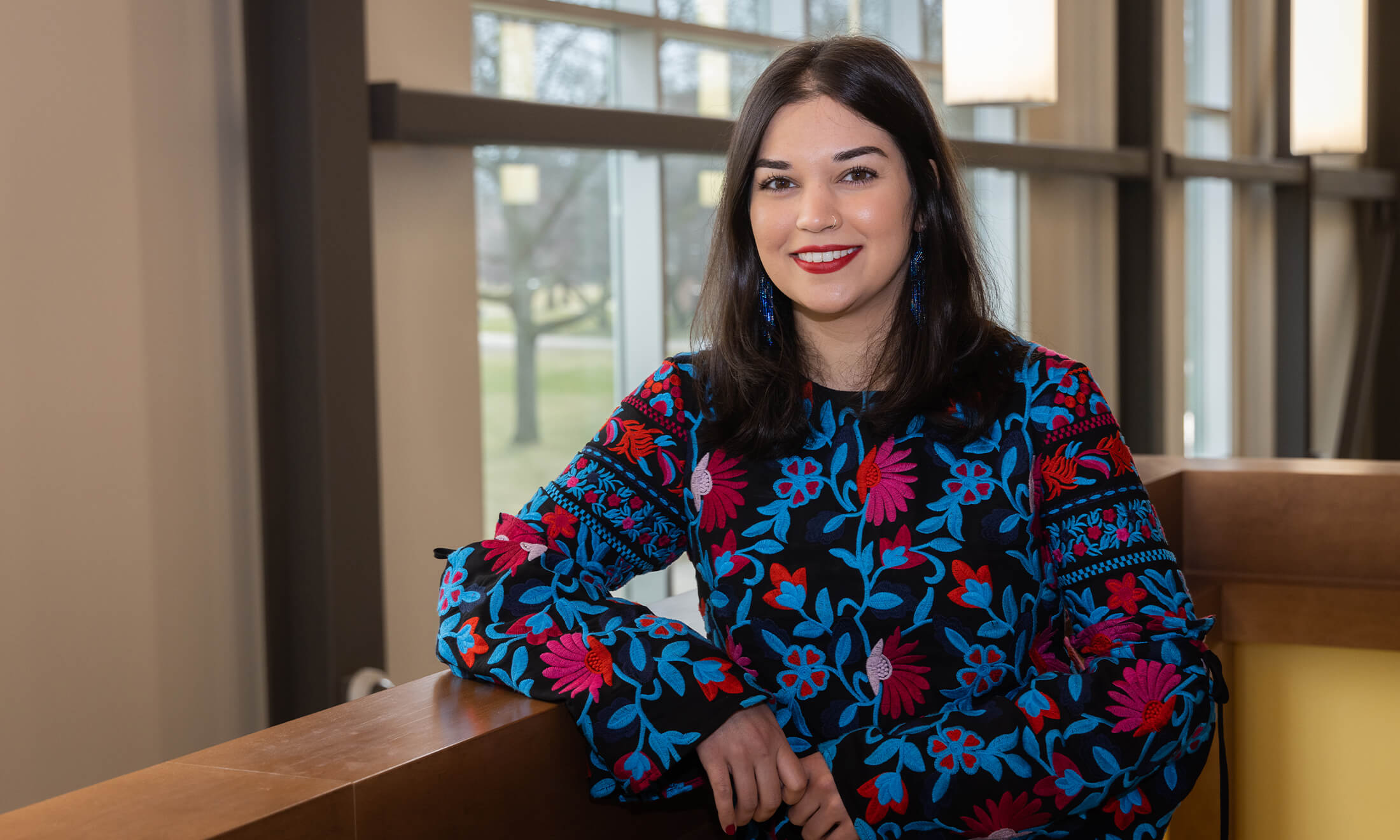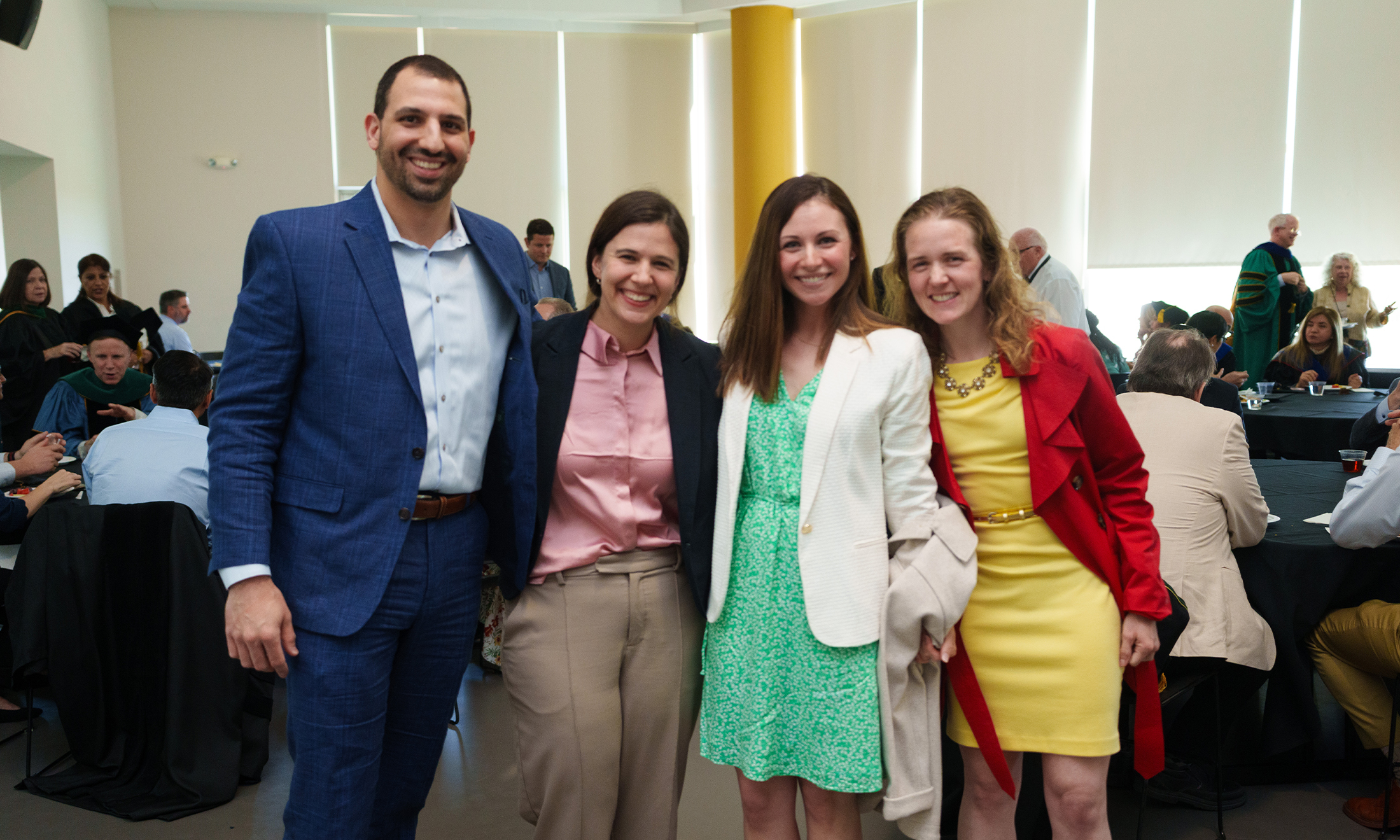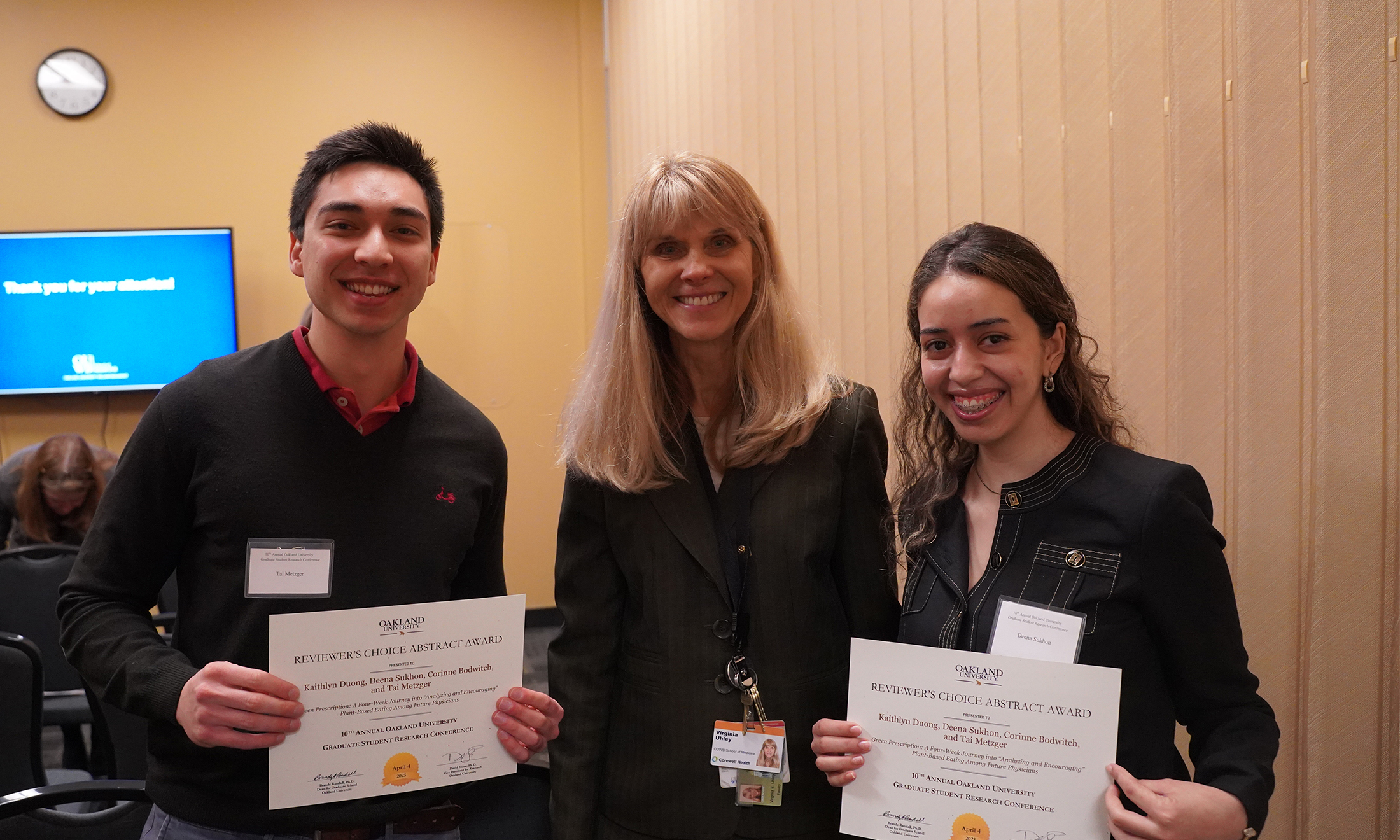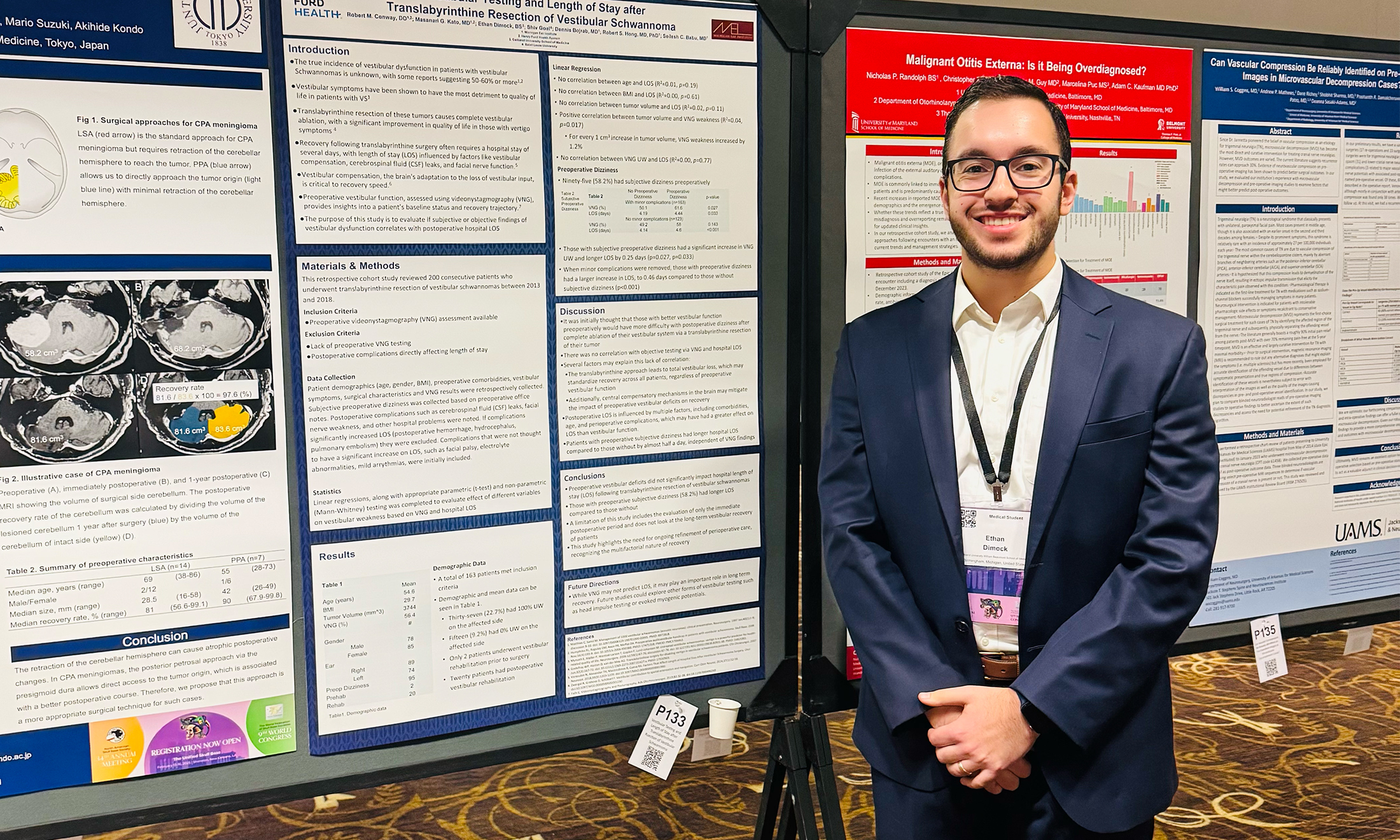‘Passport to advocacy’
OUWB alumnus Anisah Hashmi, M.D., ’22, awarded 2021 Excellence in Public Health Award
Anisah Hashmi, M.D., says being an activist is in her blood, and a community service award she recently received — along with what she did while a student at OUWB — certainly help make the case.
Hashmi, ’22, was awarded the 2021 Excellence in Public Health Award from the U.S. Public Health Service Physician Professional Advisory Committee. She was formally recognized for the accomplishment at the OUWB 2022 Honors Convocation on the eve of commencement in May.
About to begin psychiatry residency at Boston University Medical Center, Hashmi was nominated by Robert Noiva, Ph.D., associate dean for Graduate Studies and Community Integration.
Noiva wrote that since beginning her medical education at OUWB, Hashmi “has demonstrated a strong commitment to providing health-care and public health services to the neediest of” the southeastern Michigan community.
“Anisah recognizes the serious inequity in availability of services for historically marginalized communities and has used her many talents to tackle those identified disparities,” he continued.
Hashmi says she was surprised to learn she had been recognized with the Public Health Award, yet the biggest reward is being the best physician she can be as a result of giving back to the community.
“The biggest thing is it helps me stay humble…it helps me stay connected with the people who can hold me accountable,” she says. “It also keeps me connected to my empathetic center. It’s really easy to get jaded in medicine…to lose track of why you got into it in the first place.”
“The community reminds you…it’s like ‘Hey, we need you.’”
‘Passport to advocacy’
Hashmi’s father is from Lahore, Pakistan, and her mother is from West Hartford, Connecticut. Hashmi considers herself to have grown up in both places; the school year would be spent in Pakistan, summers in New England.
The reason, she says, is that her father wanted to build a hospital and school in Pakistan that would be free of cost for people who couldn’t afford health care.
“That’s where I get a lot of my motivation,” she says. “That’s where I first understood what inequality means…and a lot of that then translated to activism as a teenager and an adult.”
Hashmi says being mixed race also was a big influence.
“You have different cultural and religious influences and see the world from different vantage points…you can see where both sides are at odds,” she says.
Hashmi earned an undergraduate degree from Dickinson College, in Carlisle, Pennsylvania. She majored in American studies with a focus on Muslim American communities.
Upon graduation from Dickinson, Hashmi “worked in the NGO world for a little while.” That included time spent with the League of Women Voters in North Africa, various unions, and a stint as a freelance journalist.
At 25, Hashmi enrolled in the postbaccalaureate pre-med program at Columbia University.
“What inspired me was that I was meeting a lot of really amazing doctors in the NGO space that were doing humanitarian work,” she said.
In short, Hashmi views being a doctor as a “passport to advocacy.”
“You can use that firsthand knowledge of patient experiences of vulnerable populations as a platform,” she says. “I’m going into psychiatry with that exact mission…I want to work with refugee populations, asylum seekers, LGBTQ patients, and so on.”
Involvement at OUWB
By the time Hashmi was deciding which medical school to attend, her family has relocated to Toledo, Ohio. Wanting to be relatively close to them, she looked at several area schools.
OUWB fell in line with what she valued most, she says.
“I felt like OUWB was one that prided itself on community service, philanthropy, and that type of thing,” she says. “A lot of times it’s hard to juggle medical studies with volunteering time…OUWB said it was something they valued and actually created opportunities for students to do it.”
It didn’t take her long to get involved at OUWB.
She became active with the OUWB chapter of the American Medical Women’s Association, directing advocacy programming on human trafficking, get out the vote, and sexual and domestic violence awareness. As a member of AMWA, she co-created curricula with a local women’s shelter Haven, to train medical students with intimate partner violence intervention skills. That curriculum has now been adopted by two clinical skills training courses at OUWB. She was involved with other student interest groups, too, including Queers & Allies and the Lifestyle Medicine Interest Group.
She worked with the Michigan Coalition for Human Rights to design and deliver three annual Freedom Tours for high school students from Flint and Detroit providing social justice history, peacekeeping, writing workshops, advocacy initiatives, and other tools for these students to become more engaged in addressing issues of racial justice, economic inequity, climate change, food insecurity, and gender-based violence.
Hashmi also was selected as a fellow of the Gold Humanism Honor Society for her commitment to humanistic patient care
Hashmi says much of her community work at OUWB was about giving people voices at the right time.
“My goal was to get people who are most impacted by inequality…to the table,” she says. “Because hearing their perspectives is invaluable…and maybe it will help us be better providers in the end.”
Perhaps the biggest project she took on was in the earliest days of the COVID-19 pandemic.
Hashmi co-led the MyCovidResponse initiative, upon which local city governments relied on to coordinate aid from businesses, churches, individuals, and nonprofits.
On March 14, 2020, the group merged over 80 organizations using a mutual aid website (www.mycovidresponse.org). MyCovidResponse provided a simple path for community members to find needed assistance in the form of tutoring, mental health support, grief counseling, groceries and meals, baby supplies, women’s sanitary products, and more.
Just a few other notable aspects of this effort include:
— Hashmi and the five other founding co-members established a collaborative food/resource distribution system with partner organizations, delivering nearly 70,000 meals per week to each doorstep.
— They created a digital emergency warehouse management system that transformed the 250,000-square-foot Oakland University student center into a safe-distance food distribution warehouse, saving the project huge amounts of time and money.
— Hashmi oversaw the daily operations of this food distribution center from March to August 2020 and led trainings for over 300 volunteers to assist in distribution activities.
“It was amazing,” she says. “It was the biggest show of humanism that I’ve ever seen in my life…from the goodness of their heart, people were willing to volunteer their time every single day. I felt like it was incredible.”
With commencement at OUWB behind her, Hashmi says she is looking forward to the next big step in her career.
“(Boston University Medical Center) offers exactly what I was looking for in a program,” she says. “They have multiple clinics geared toward refugees and asylum seekers…they have a free food pantry, and a rooftop garden where you can prescribe veggies to your patients. They have LGBTQ-specific clinics.”
“It embodies exactly what I’m looking for and all of my values,” she says. “I’m very excited.”

 July 06, 2022
July 06, 2022
 By Andrew Dietderich
By Andrew Dietderich









